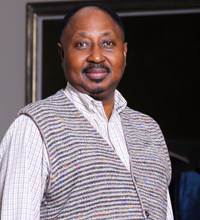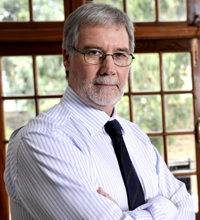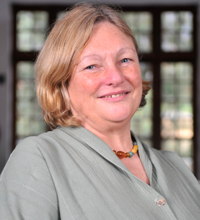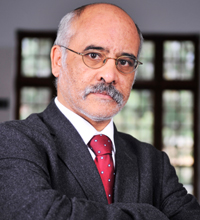Role of DVCs revised
13 April 2009In a recent message to faculty and staff, Vice-Chancellor Dr Max Price announced the new portfolios for deputy vice-chancellors, which include some fundamental changes.
Firstly, executive directors will have final accountability for their respective areas, and not, as had until now been the case, the deputy vice-chancellors. For purposes of academic oversight and for ease of managing reporting lines, most executive directors will, however, still have a line report to a DVC for operational management.
In this regard, a DVC's duties will include signing leave forms, claims, resolving conflicts, and sitting on selection committees.
Secondly, the DVCs will each have - as their main responsibility - one or more key strategic goals (such as internationalisation or achieving 'graduateness').
As the strategic goals have not yet been fully canvassed with all constituencies, the DVC portfolios are provisional, based on the likely strategic goals. Some may still change.
Where there is a natural alignment between an executive director's department and a DVC's key performance areas, a link has been made through the reporting line.
The allocations below reflect an appropriate clustering of executive reporting lines and portfolios, based on their likely composition.
Vice-Chancellor, Dr Max Price

As Vice-Chancellor, Dr Max Price will be accountable to Council for the leadership of the university as a whole, and for determining the university's key objectives, ensuring their implementation. This includes?accountability for transformation. Price will chair the Senate, the Senate Executive Committee, the University Strategy Forum, the University Development Committee, the Vice-Chancellor's Management Advisory Group, the Senior Leadership Group, the Transformation Management Advisory Committee, and the Risk Management Committee.
Price will focus his efforts on representing the University to key external parties such as donors, senior government officials, alumni, other universities, and community and business partners.?Price is a member of the board of directors of Higher Education South Africa (HESA) and a member of the Southern African Regional Universities Association (SARUA), the Association of African Universities, and the Commonwealth Universities Association. He remains a trustee of the University Foundation and of the Ukukhula Trust.
The following staff report to the Vice-Chancellor:
- Deputy Vice-Chancellors
- Registrar
- Executive Director - Finance
- Executive Director - Communication and Marketing
- Director - Office of the Vice-Chancellor's Ombud
Deputy Vice-Chancellor, Professor Thandabantu Nhlapo

Nhlapo will function as the senior DVC. He will act for the Vice-Chancellor during periods of absence and he provides direct support to the Vice-Chancellor in the management and co-ordination of the university's special projects.?
Nhlapo's main portfolio is to address the strategic goal of making UCT an Afropolitan university. His portfolio includes Africa links and the University Science Humanities & Engineering Partnerships in Africa (USHEPiA) initiative.
He will also have executive oversight for: human resources, properties and services, and development and alumni affairs. Nhlapo will chair the Operations Management Advisory Group, the PASS Forum, the Senior Staff Management Group, the Senate Nominations Committee, the Distinguished Teacher Award Committee, the Staff Development Committee, and the USHEPiA Management Committee.
The following staff report to Nhlapo:
- Executive Director - Human Resources
- Executive Director - Properties and Services
- Executive Director - Development and Alumni
- Project Manager - Office of the Vice-Chancellor
Deputy Vice-Chancellor, Professor Danie Visser

Visser's portfolio relates to the strategic goal of increasing UCT's research profile and implementing the university's mission to be research-led.
He has executive oversight for: faculty matters, academic staffing, research, innovation, and postgraduate affairs.
Visser will chair the Doctoral Degrees Board, the Board for Graduate Studies, the University Research Committee, the Visiting Scholars Fund, the Academic Heads of Department Working Group, the Fellows Committee, the Postgraduate Funding Committee and the Boards of the Centres of Excellence at UCT. He will be a co-chair (with the Head of Health) of the UCT/PGWC Department of Health Joint Standing Advisory Committee.
The following staff report to Visser:
- Faculty Deans
- Dean - Centre for Higher Education Development
- Director - Graduate School of Business
- Director - Research Support Services
- Director - Research Contracts and Innovation
- Director - Postgraduate Funding Office
Deputy Vice-Chancellor, Professor Jo Beall
Beall's portfolio addresses three strategic goals:

- Improving the quality of teaching and learning, including the idea of 'graduateness'
- Internationalisation
- Social responsiveness
Her portfolio includes executive oversight for: university libraries, Information Communication Technology Services, the Institutional Planning Department, quality assurance, social responsiveness, and government and external liaison.
Professor Beall will chair the Cape Library Consortium (CALICO) board, the University ICT Committee, the Internationalisation Management Advisory Group, the Senate Academic Planning Committee, Examinations and Assessment Committee,?the Quality Assurance Working Group, and the University Social Responsiveness Committee. She will fulfil the role of the university's trustee on the Cape Higher Education Consortium (CHEC) as well as various local and regional government structures on which the university is represented.?
The co-ordinators of certain proposed new institution-wide social responsiveness projects, such as those addressing violent crime, climate change and sustainability (in some cases co-ordinated by pro-vice-chancellors) will report to Beall.
The following staff report to Beall:
- Executive Director - Libraries
- Executive Director - Information Communication & Technology Services
- Director - International Academic Programmes Office
- Director - Institutional Planning
- Co-ordinators of institution-wide projects
Acting Deputy-Vice-Chancellor, Professor Crain Soudien

Soudien's portfolio is to support the Vice-Chancellor in the area of institutional transformation. This will include accountability for the social justice portfolios (such as HIV/AIDS and discrimination), the staff experience (institutional climate), student demographic change, and the student experience as it affects transformation. His portfolio includes executive oversight for the broad area of student life (Department of Student Affairs).?
Soudien will chair the Admissions and Progression Committee, the Joint Consultative Committee for Employment Equity/Transformation Forum, the Undergraduate Student Funding Committee, and the University Student Affairs Committee. He will be a member of the Institutional Forum and may be a co-chair of it.
The following staff report to Soudien:
- Executive Director - Department of Student Affairs
- Director - Discrimination & Harassment Office
- Director - HIV/AIDS Co-ordination - UCT
- Transformation officer/manager
 This work is licensed under a Creative Commons Attribution-NoDerivatives 4.0 International License.
This work is licensed under a Creative Commons Attribution-NoDerivatives 4.0 International License.
Please view the republishing articles page for more information.










